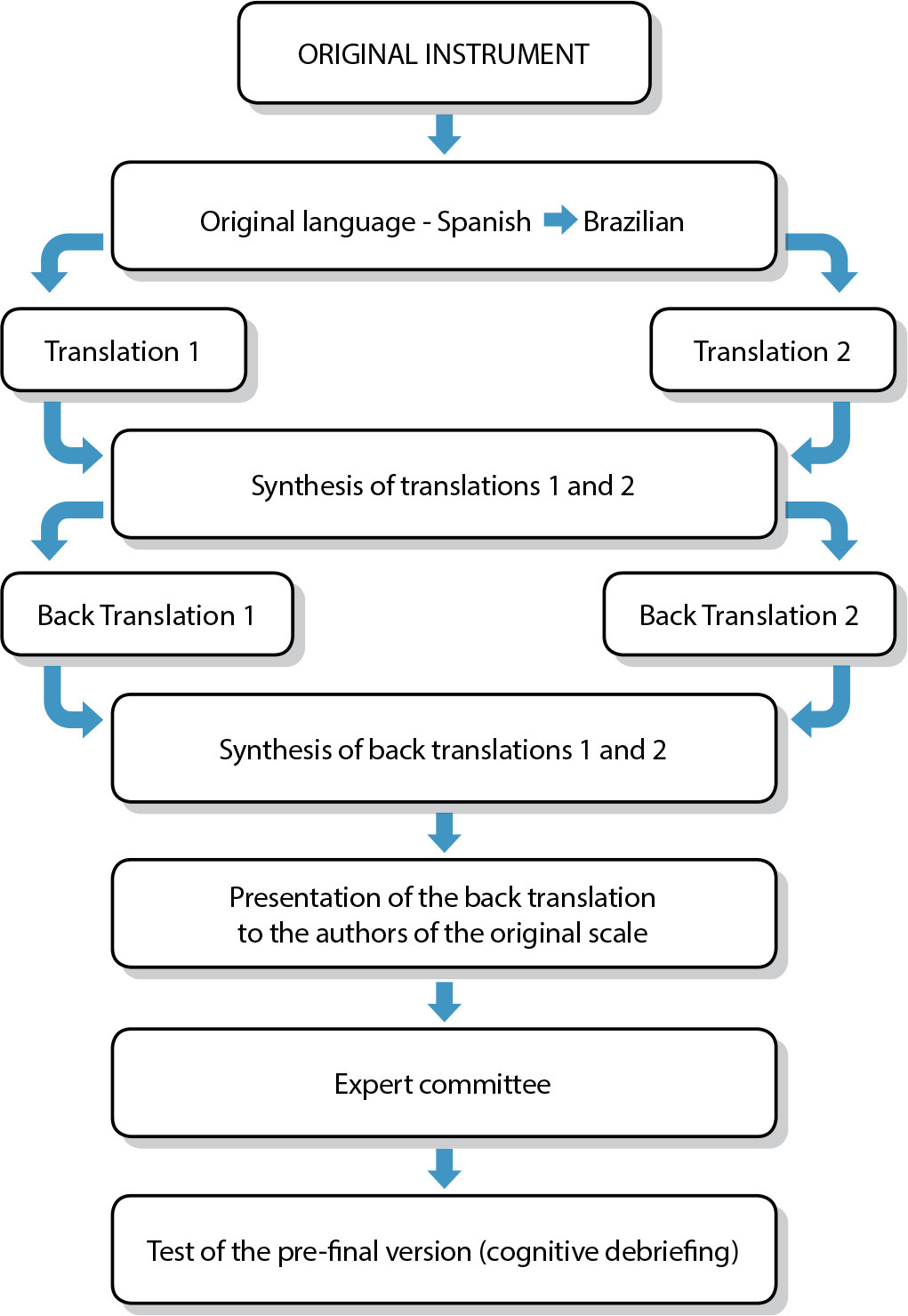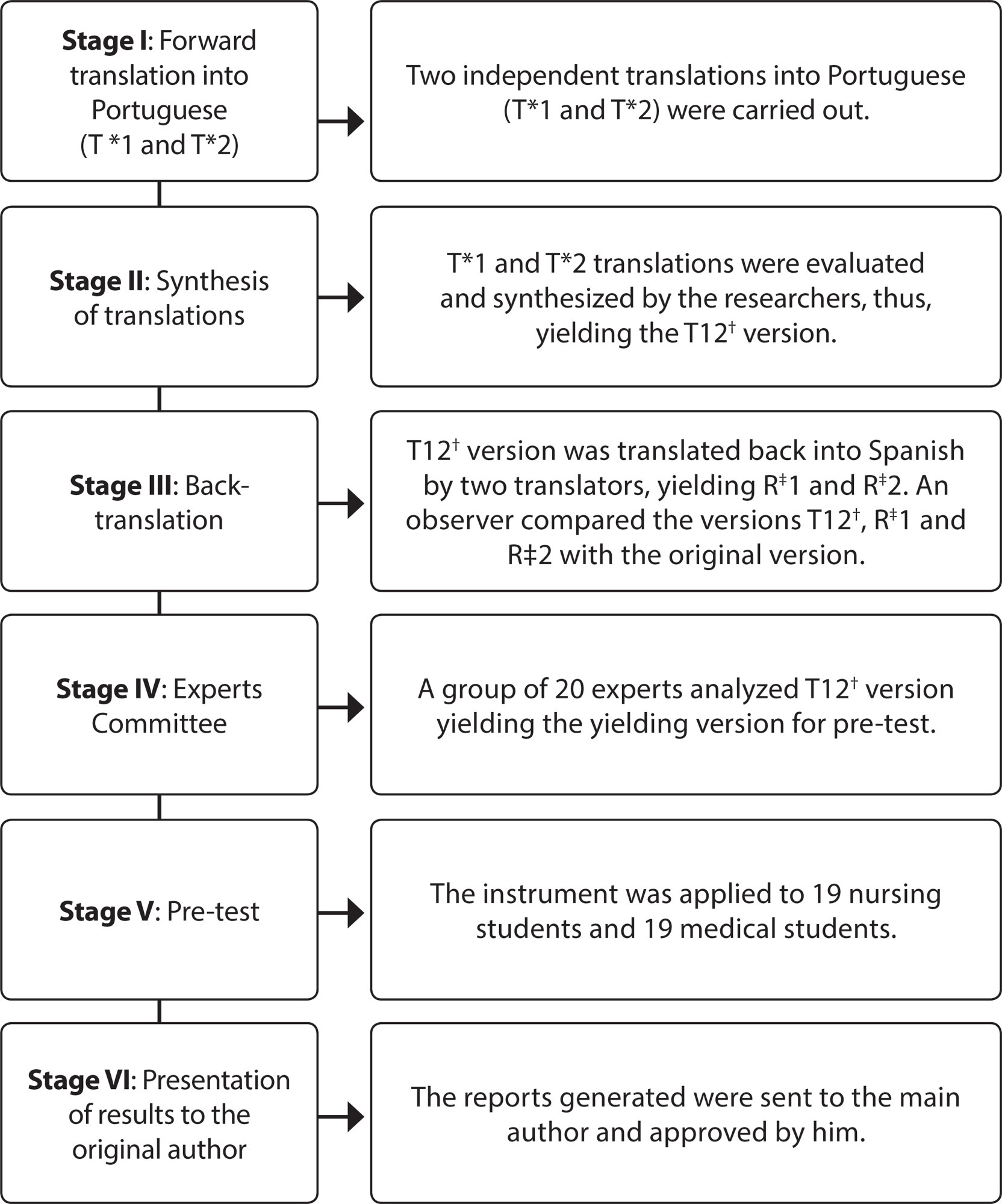-
ORIGINAL ARTICLE
Cross-cultural adaptation and validation of the Healthy Work Environment Assessment Tool in Brazilian culture
Revista Brasileira de Enfermagem. 2024;77(4):e20230505
09-20-2024
Resumo
ORIGINAL ARTICLECross-cultural adaptation and validation of the Healthy Work Environment Assessment Tool in Brazilian culture
Revista Brasileira de Enfermagem. 2024;77(4):e20230505
09-20-2024DOI 10.1590/0034-7167-2023-0505
Visualizações0ABSTRACT
Objectives:
to adapt and validate the content of the Healthy Work Environment Assessment Tool for Brazilian culture, and evaluate the practical aspects of its application.
Methods:
methodological study that followed six stages: translation; synthesis; back translation; content validation by a group of experts, pre-testing and approval of the process by the author of the original instrument.
Results:
the first three stages were carried out by contracted companies. In the committee, two items and the title of a subscale were evaluated in a second round, when consensus was reached among experts. In the pre-test, more than 93% of professionals agreed that the tool was easy to understand. The average completion time was 8.53 minutes. The American Association of Critical-Care Nurses authorized publication of the results.
Conclusions:
the adaptation of the tool to Brazilian culture was completed following the adopted framework. In addition to the evidence of content validity, the tool appears promising for managerial use.
Palavras-chave: Cross-Cultural ComparisonHealth Facility EnvironmentTranslatingValidation StudyWorking ConditionsVer mais -
ORIGINAL ARTICLE
Functional performance assessment scale for children and adolescents with cancer: cross-cultural study
Revista Brasileira de Enfermagem. 2024;77(2):e20230331
06-14-2024
Resumo
ORIGINAL ARTICLEFunctional performance assessment scale for children and adolescents with cancer: cross-cultural study
Revista Brasileira de Enfermagem. 2024;77(2):e20230331
06-14-2024DOI 10.1590/0034-7167-2023-0331
Visualizações0ABSTRACT
Objectives:
to describe the methodological process of cross-cultural adaptation of the PlayPerformance Scale for Children to Brazilian Portuguese.
Methods:
methodological study of translation and cross-cultural adaptation in six stages: translation, synthesis of translations, back-translation, evaluation by a committee of judges, evaluation by expert nurses, and pretest. The agreement and representativeness of the items were assessed using the content validity index. A minimum value of 80% agreement was considered.
Results:
all stages of the translation and cross-cultural adaptation process were satisfactory. In the evaluation performed by the committee of judges, all items obtained agreement above 80%. Fifteen pediatric nurses conducted the content validation, suggesting necessary modifications for understanding and application. Thirty children and adolescents with cancer were assessed with the scale for the pre-test.
Conclusions:
the scale was cross-culturally adapted to Brazilian Portuguese. The need for psychometric testing in a consistent sample is emphasized.
Palavras-chave: Cross-Cultural ComparisonNursing Methodology ResearchOncologyPediatric NursingPhysical Functional PerformanceVer mais -
ORIGINAL ARTICLE
Content validity evidence of the Brazilian version of the Cognitive Symptom Checklist-Work-21
Revista Brasileira de Enfermagem. 2023;76(4):e20220453
09-04-2023
Resumo
ORIGINAL ARTICLEContent validity evidence of the Brazilian version of the Cognitive Symptom Checklist-Work-21
Revista Brasileira de Enfermagem. 2023;76(4):e20220453
09-04-2023DOI 10.1590/0034-7167-2022-0453
Visualizações0ABSTRACT
Objective:
to cross-culturally adapt and assess the content validity evidence of the Cognitive Symptom Checklist-Work-21 for the Brazilian context.
Method:
a psychometric study of cross-cultural adaptation, covering the stages of translation, reconciliation, back-translation, intercultural equivalence assessment and content validity evidence analysis, considering Content Validity Ratio parameters in breast cancer survivors.
Results:
the translations were equivalent to the original version. Colloquial expressions were modified, tense, verbal adjusted, and two items containing multiple commands were separated. The final version now contains 22 items, presenting semantic, conceptual, idiomatic and experimental equivalences. The pre-test indicated good understanding and ease in the response process.
Conclusion:
the final version was defined as “Lista de verificação de sintomas cognitivos relacionados ao trabalho - 22 itens”, showing good linguistic equivalence and strong evidence of content validity in the Brazilian context.
Palavras-chave: Breast NeoplasmsCancer SurvivorsCross-Cultural ComparisonReturn to WorkValidation StudyVer mais
-
ORIGINAL ARTICLE
RESVECH 2.0: cross-cultural adaptation for Brazil, reliability and validity for the evaluation of venous ulcers
Revista Brasileira de Enfermagem. 2023;76(2):e20220185
03-27-2023
Resumo
ORIGINAL ARTICLERESVECH 2.0: cross-cultural adaptation for Brazil, reliability and validity for the evaluation of venous ulcers
Revista Brasileira de Enfermagem. 2023;76(2):e20220185
03-27-2023DOI 10.1590/0034-7167-2022-0185
Visualizações0Ver maisABSTRACT
Objectives:
to cross-culturally adapt the scale Resultados en la valoración y evolución de la cicatrización de las heridas - RESVECH 2.0 for Brazilian Portuguese; to estimate the internal consistency and construct and criterion validity of the scale in the evaluation of venous ulcers.
Methods:
methodological study, based on international guidelines for studies of this type. Wounds were evaluated using the RESVECH 2.0 and Pressure Ulcer Scale of Healing 3.0 (PUSH). Descriptive analysis, confirmatory factor analysis, Cronbach’s alpha and Spearman’s correlation (p<0.05) were used.
Results:
12 nurses and 77 people with 153 venous ulcers participated in the study. The translation was successful, the proposed factor model was validated, and Cronbach ‘s alpha = 0.832 (95%CI, 0.780-0.880) and correlation coefficient (RESVECH 2.0 and PUSH 3.0) = 0.74 were obtained.
Conclusions:
the adaptation of RESVECH 2.0 to Brazilian Portuguese is robust. Reliability and validity show compatibility for use in the country in the evaluation of venous ulcers.

-
ORIGINAL ARTICLE
Latino Students Patient Safety Questionnaire: cross-cultural adaptation for Brazilian nursing and medical students
Revista Brasileira de Enfermagem. 2020;73(suppl 6):e20190621
12-21-2020
Resumo
ORIGINAL ARTICLELatino Students Patient Safety Questionnaire: cross-cultural adaptation for Brazilian nursing and medical students
Revista Brasileira de Enfermagem. 2020;73(suppl 6):e20190621
12-21-2020DOI 10.1590/0034-7167-2019-0621
Visualizações0ABSTRACT
Objectives:
to perform a cross-cultural adaptation of the Latino Student Patient Safety Questionnaire for Brazilian Nursing and Medical students.
Methods:
methodological study carried out in six stages — forward translation, synthesis, back-translation, expert committee assessment, pre-test and reporting to the authors of the original instrument. Data at the expert committee and pre-test stages were collected and analyzed using the web platform e-Surv. The level of agreement adopted for the expert committee evaluation with 20 participants and the pre-test evaluation with 38 students was ≥ 90%.
Results:
the first evaluation round by the expert committee showed a <90% agreement for 21 out of the 26 questionnaire items, requiring adjustments. In the pre-test, three items in the instrument reached a <90% agreement and were revised to obtain the final version.
Conclusions:
the Brazilian version of the Latino Student Patient Safety Questionnaire instrument was considered culturally adapted to Brazilian Portuguese.
Palavras-chave: Cross-Cultural ComparisonPatient SafetyStudents NursingStudents, MedicalValidation StudyVer mais
-
ORIGINAL ARTICLE
Translation and content validation of the Geriatric Institutional Assessment Profile for Brazil
Revista Brasileira de Enfermagem. 2019;72(suppl 2):205-213
12-05-2019
Resumo
ORIGINAL ARTICLETranslation and content validation of the Geriatric Institutional Assessment Profile for Brazil
Revista Brasileira de Enfermagem. 2019;72(suppl 2):205-213
12-05-2019DOI 10.1590/0034-7167-2018-0602
Visualizações0Ver maisABSTRACT
Objective:
to describe the process of content adaptation and validation of the Geriatric Institutional Assessment Profile (GIAP) for nurses working in the health care for older adults in Brazilian hospitals.
Method:
methodological study conducted in five stages: initial translation, synthesis of initial translation, back translation, evaluation by committee of judges, and pre-test for cultural adaptation of the instrument.
Results:
the instrument evaluation had good agreement between the judges, with general content validity of 0.94. The items of the translated version evaluated as unsatisfactory by the judges were reformulated from the professionals’ considerations in each group. Thirty-one subjects participated in the study. They considered the instrument easy-to-understand and suggested minor adjustments in some items.
Conclusion:
the content of the Brazilian version of the GIAP is considered adapted and validated, with potential use in hospital institutions. The next stage will be to submit the instrument to the evaluation process of its psychometric properties for use in Brazilian populations.
-
RESEARCH
Cross-cultural adaptation of the General Comfort Questionnaire to Brazilian patients with myocardial infarction
Revista Brasileira de Enfermagem. 2018;71(6):2998-3005
01-01-2018
Resumo
RESEARCHCross-cultural adaptation of the General Comfort Questionnaire to Brazilian patients with myocardial infarction
Revista Brasileira de Enfermagem. 2018;71(6):2998-3005
01-01-2018DOI 10.1590/0034-7167-2017-0557
Visualizações0ABSTRACT
Objective:
Describe the first stages of the cross-cultural adaptation process of the General Comfort Questionnaire for myocardial infarction patients in intensive care units.
Method:
This is a study of qualitative and quantitative research and analysis techniques. Conceptual, item, semantic and operational equivalence was performed. Fifteen items were added to the original instrument to better represent the comfort experienced by myocardial infarction patients in intensive care units. The content validity index was applied to analyze the answers of the experts; it was considered adequate above 0.78.
Results:
Some changes suggested by the experts for better understanding were adopted. All items were kept, obtaining a scale of sixty-three items. In the pre-test conducted with 30 subjects, the instrument was considered adequate to the target audience.
Conclusion:
The adapted version of the General Comfort Questionnaire for people with myocardial infarction is adequate to the target audience.
Palavras-chave: Comfort CareCross-Cultural ComparisonMyocardial InfarctionQuestionnairesValidation StudiesVer mais



